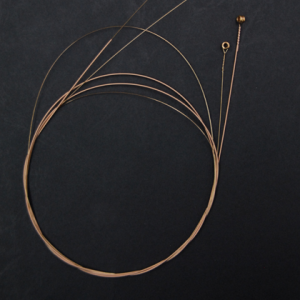
This post will focus on varieties of metal strings available for steel-string acoustic guitars. If you have a classical, flamenco, or folk guitar, please read our post that covers types of nylon guitar strings.
Steel guitar strings have a bright sound popular in pop, rock, country, and folk styles. Steel-string acoustic guitars are constructed with a metal truss rod in the guitar neck to brace against the tension of metal strings. Do not install steel strings on any guitar designed for nylon strings. Since these instruments lack a truss rod, you might warp or break your guitar neck!
In a typical set of six guitar strings, the two thinnest strings are plain (bare steel) and the rest are wound. (Plain strings are sometimes called unwound.) Wound strings feature a metal alloy string wound around a steel core. A breakthrough in string design, winding two strings together creates a single, heavy thread that vibrates evenly so pitch can be clear and stable.
Bronze
The metal alloy called bronze, was traditionally a blend of 88% copper and 12% tin. In commercial bronze, zinc has replaced tin, and modern bronze acoustic guitar strings are actually a mix of bronze with other materials, such as phosphor, zinc and copper on a steel core.
80/20 and 85/15 Bronze or Brass Strings – The Brightest Sound
As the name suggests, two metals are blended to form an 80/20 alloy using a ratio of 80% copper and 20% zinc. This is known as low brass. You may already be familiar with the term brass if you know something about orchestral instruments. Some manufacturers have taken to calling these strings “80/20 bronze” even though these are not true bronze. You will also find sets with an 85/15 ratio, sometimes referred to as “Vintage Bronze”.
The tone of new 80/20 strings is brilliant but fades quickly to warm. A change in tone is not always desired by musicians, and this is why we have a variety of string options. Manufacturers of “coated” strings boast that their tone stays consistent much longer. This is true, but the tone of a coated string is not as bright to begin with.
Phosphor Bronze – Warm Sounding
Phosphor bronze strings combine copper with zinc, tin, iron, and phosphor. The strings are still mostly copper, but these other metals combine to provide a longer lasting tone than regular bronze. The tone is warmer with enhanced mids. These strings tend to hide finger noise and pick scrapes better than others. These guitar strings would sound good for jazz and softer styles.
Gold Plated – Medium Bright
Gold resists corrosion. While it seems extravagant, some players are willing to pay for gold-plated strings. Under the gold-plating is usually 80/20 bronze wound strings or phosphor bronze. These are somewhat popular with players who dislike the synthetically coated strings. Often these can be gold-plated 80/20 bronze wrap wire and phosphor bronze sets. The bright tone is said to last until the string breaks from old age.
Titanium – Medium Bright
Titanium strings are known for their resistance to corrosion. As they are not magnetic, titanium strings are not used with electric guitars. They offer a medium-to-bright tone, and can cost over 30X the cost of common bronze strings.
Silk and Steel String Sets
These strings sets use steel high E and B strings, with the remainder of strings made of bronze or brass windings over a nylon core. This makes for a softer sound than strings wound on a steel core. These strings are excellent for beginners because they are easier to play. These types of acoustic guitar strings are usually found on very lightly-braced acoustic guitars and on guitars that lack a truss rod.
Choosing Your String Gauge
When purchasing guitar strings, you’ll select a string gauge. The term gauge refers to thickness. The lighter the gauge, the brighter and weaker the sound. In contrast, heavier strings sound duller but project louder.
Your guitar has been set up by the manufacturer for a certain gauge of strings, probably light gauge. If you change the string gauge you may need to hire a guitar tech to adjust your guitar setup to maintain optimum playability. Most guitars ship with light or extra light strings, where the thinnest string is .012 or .011 millimeters thick.